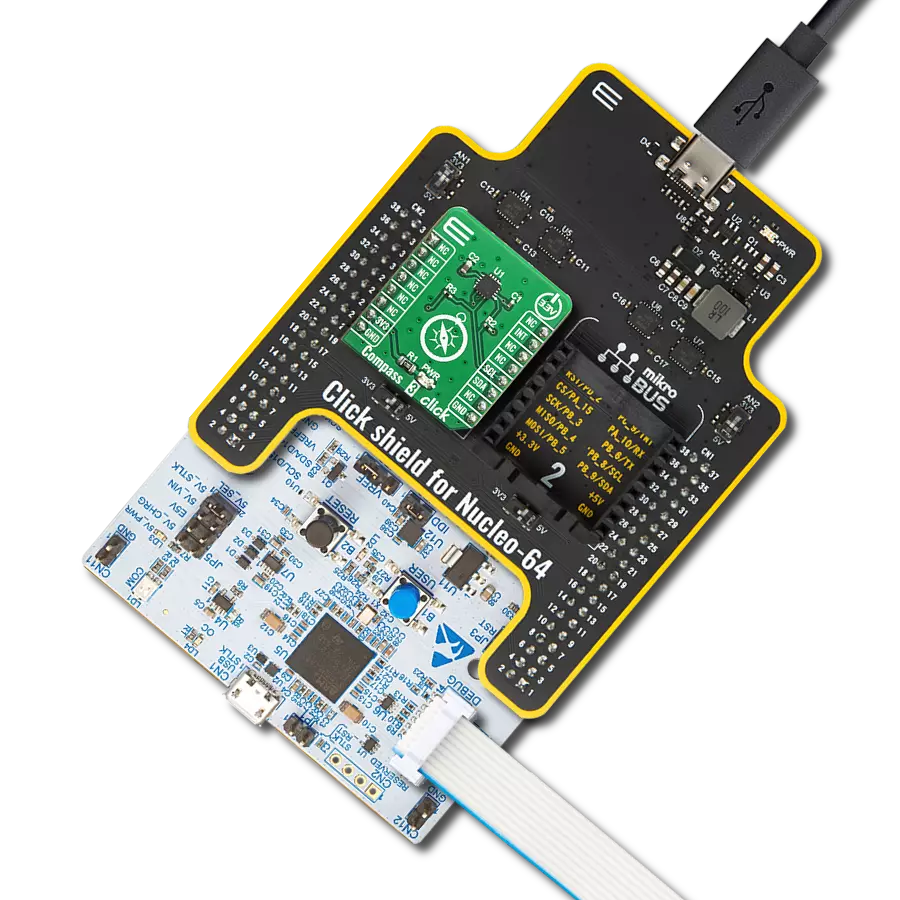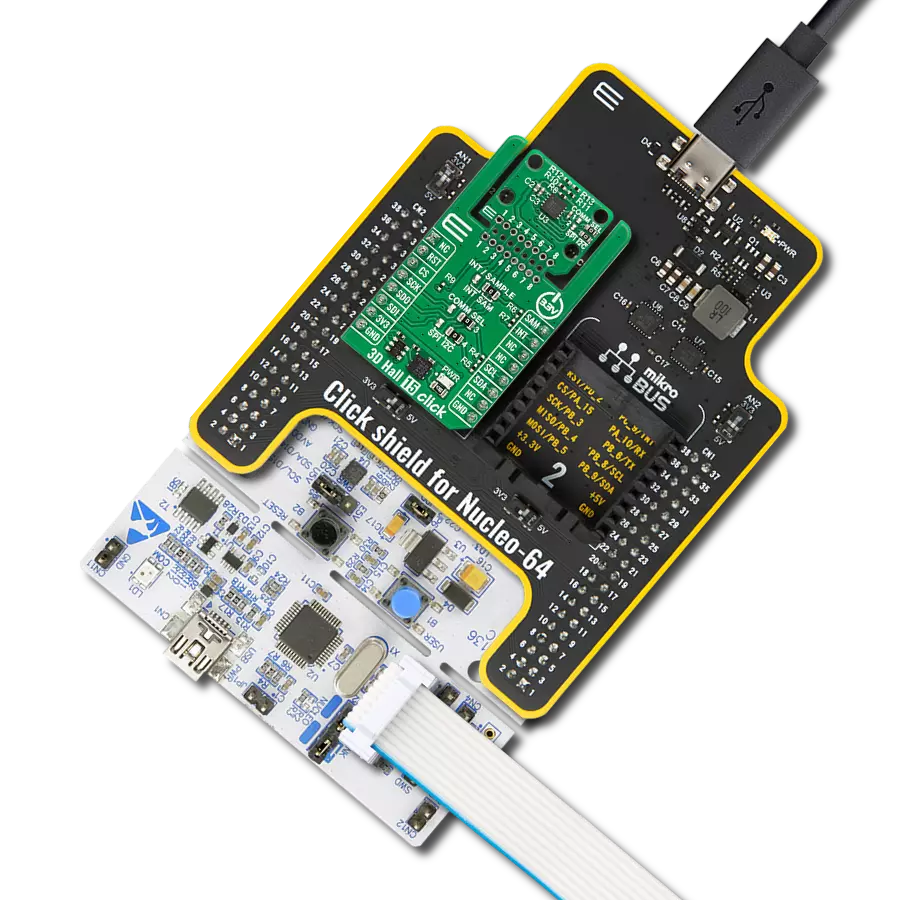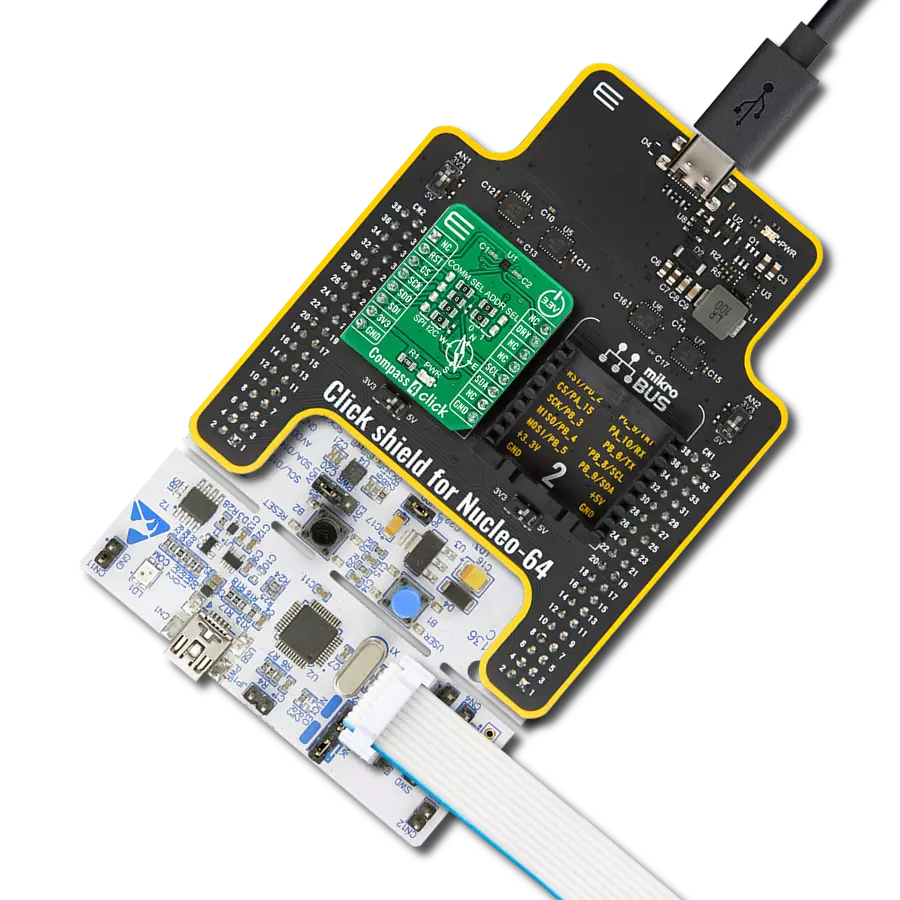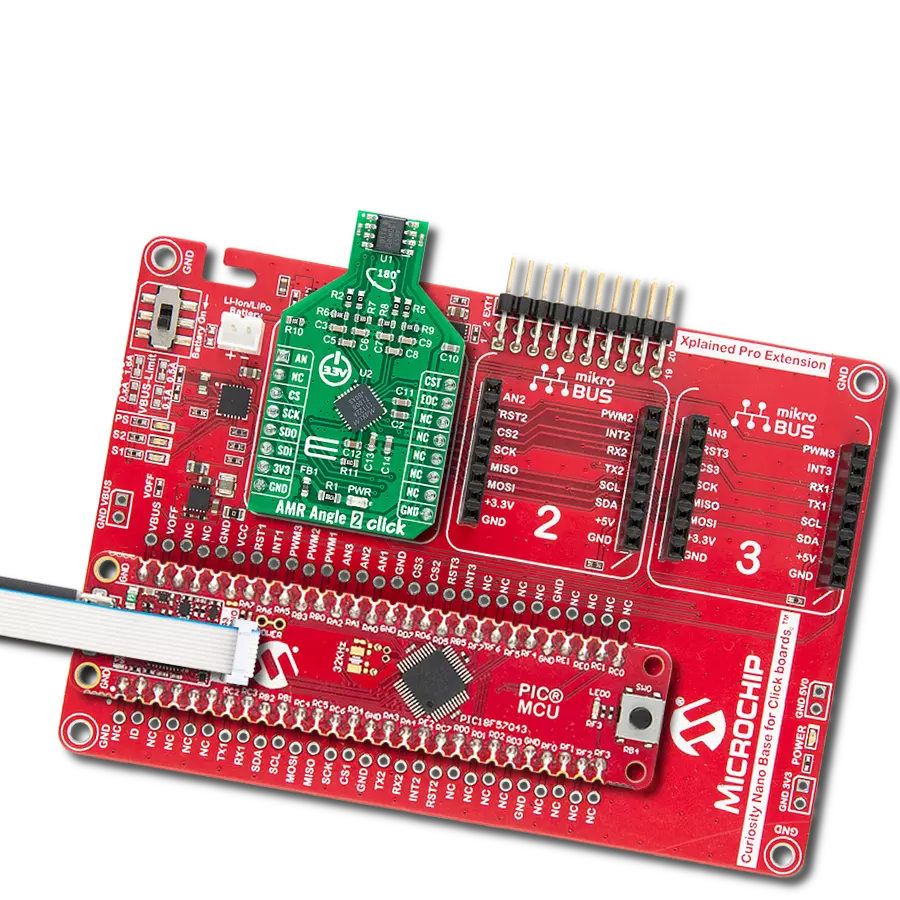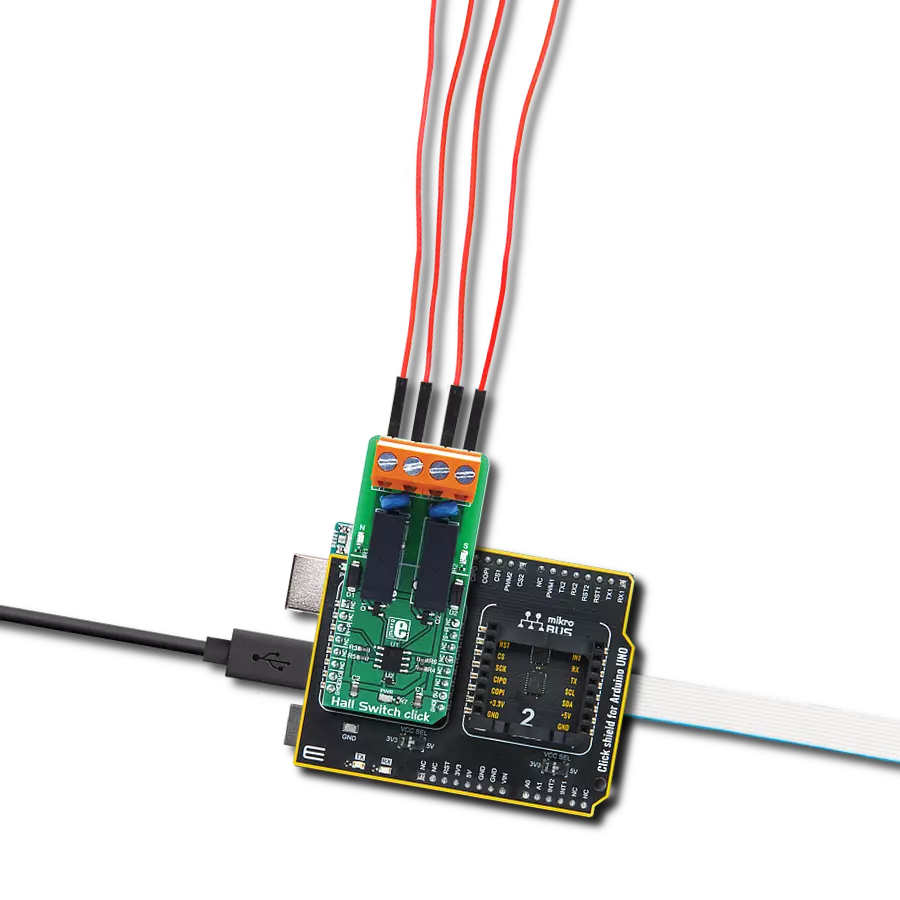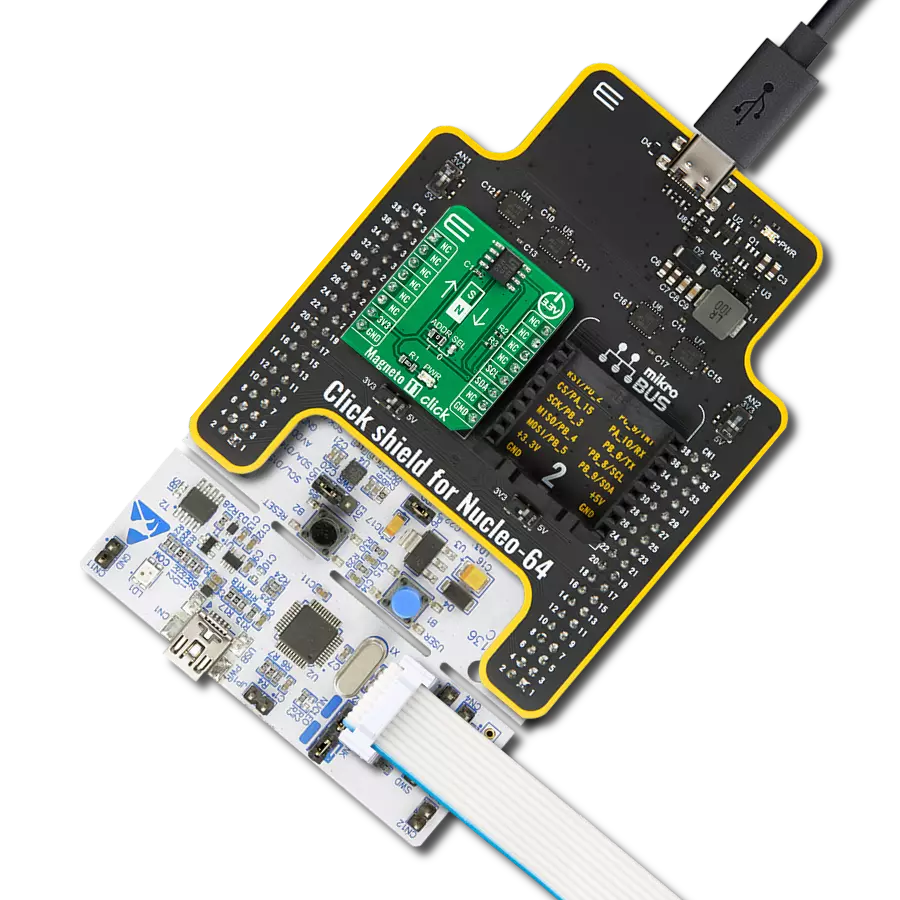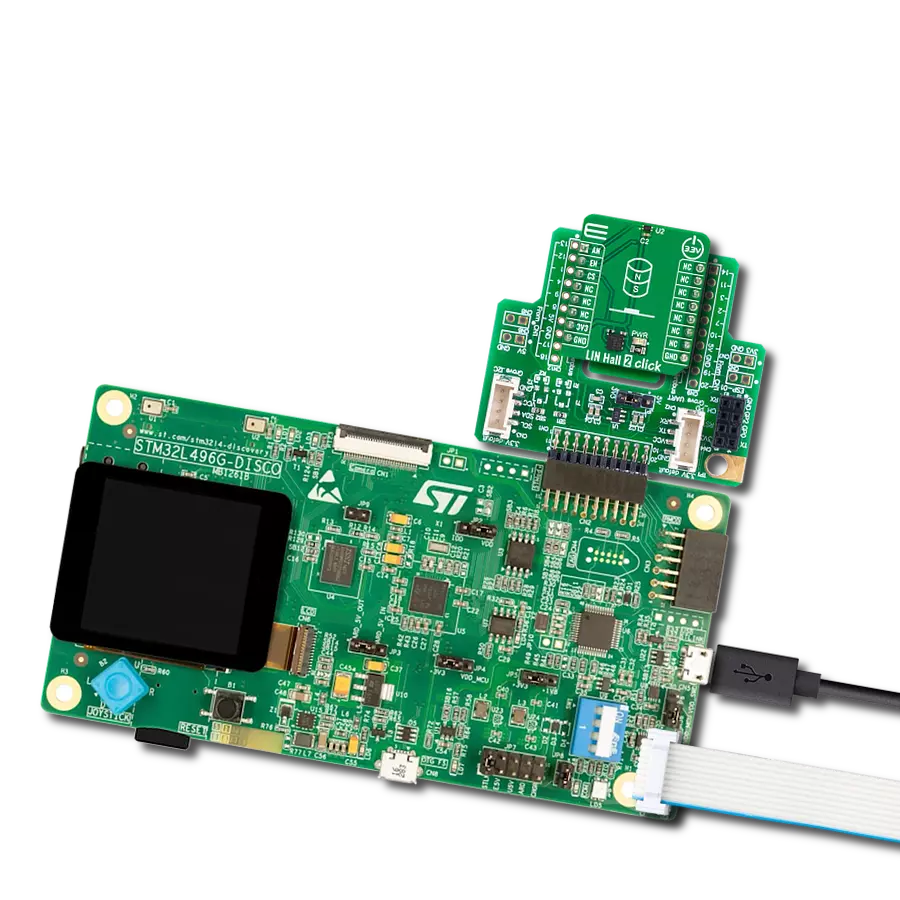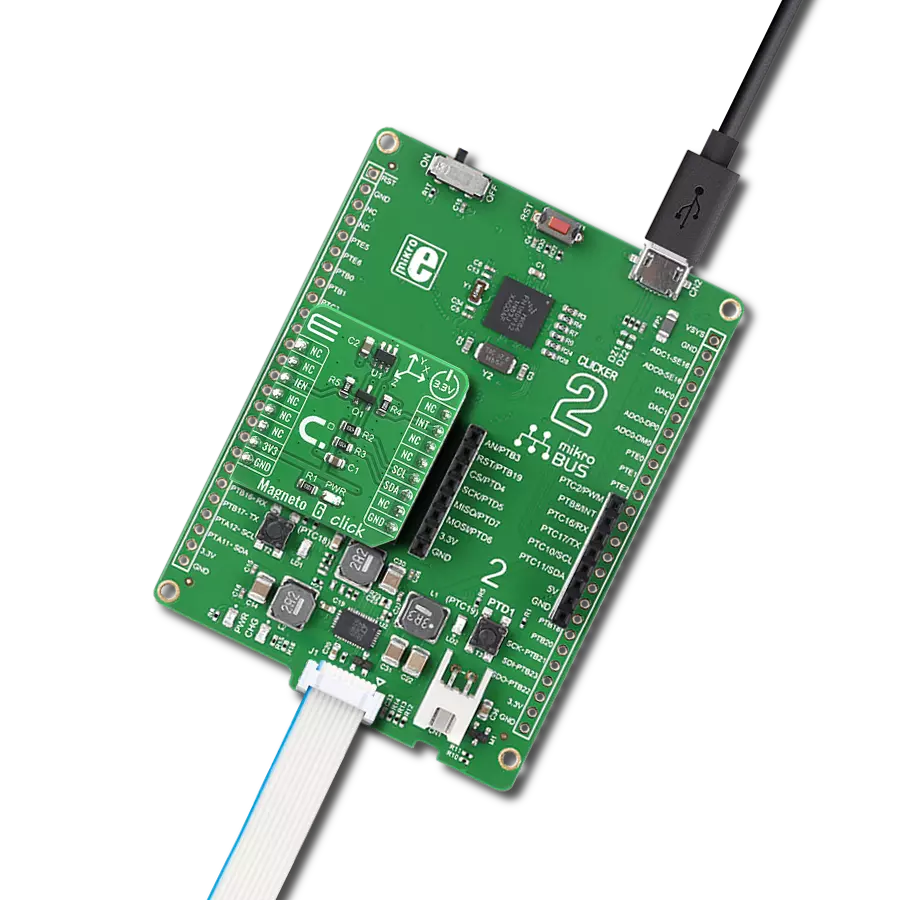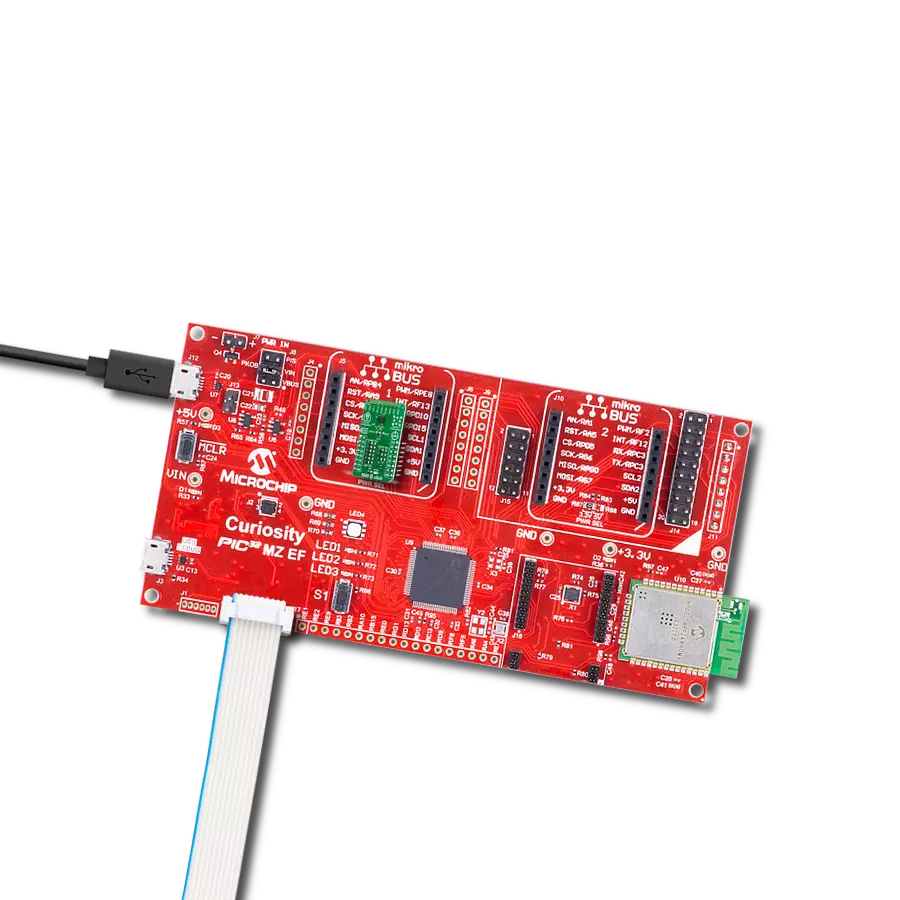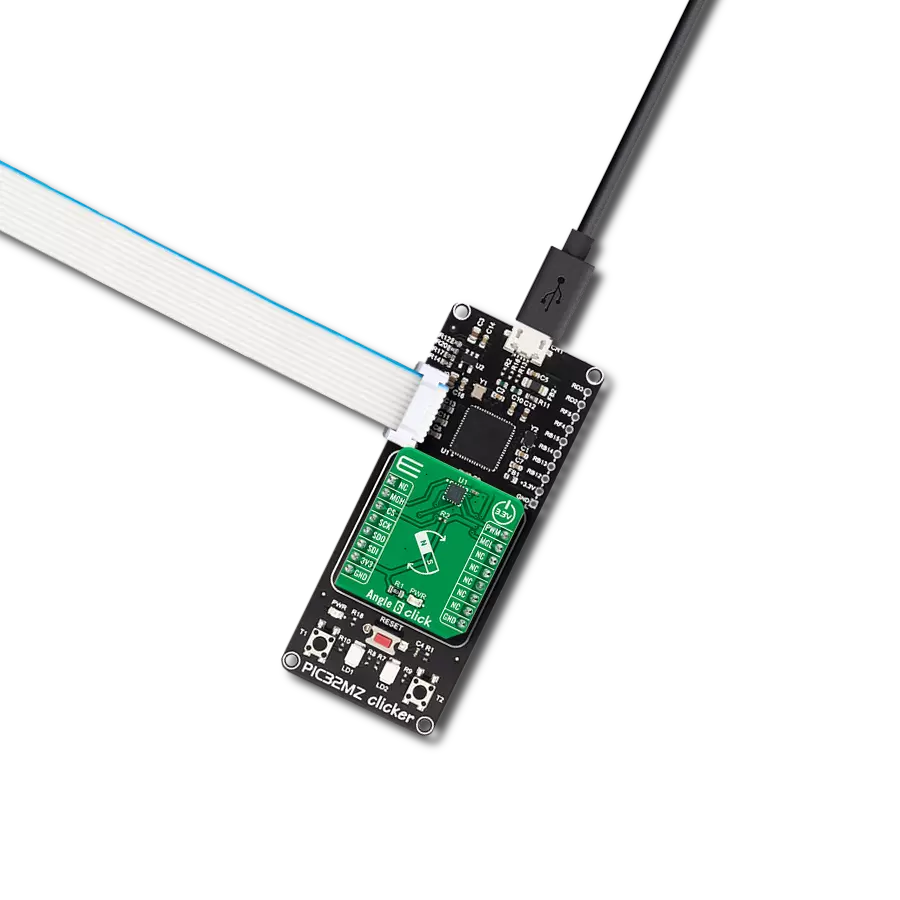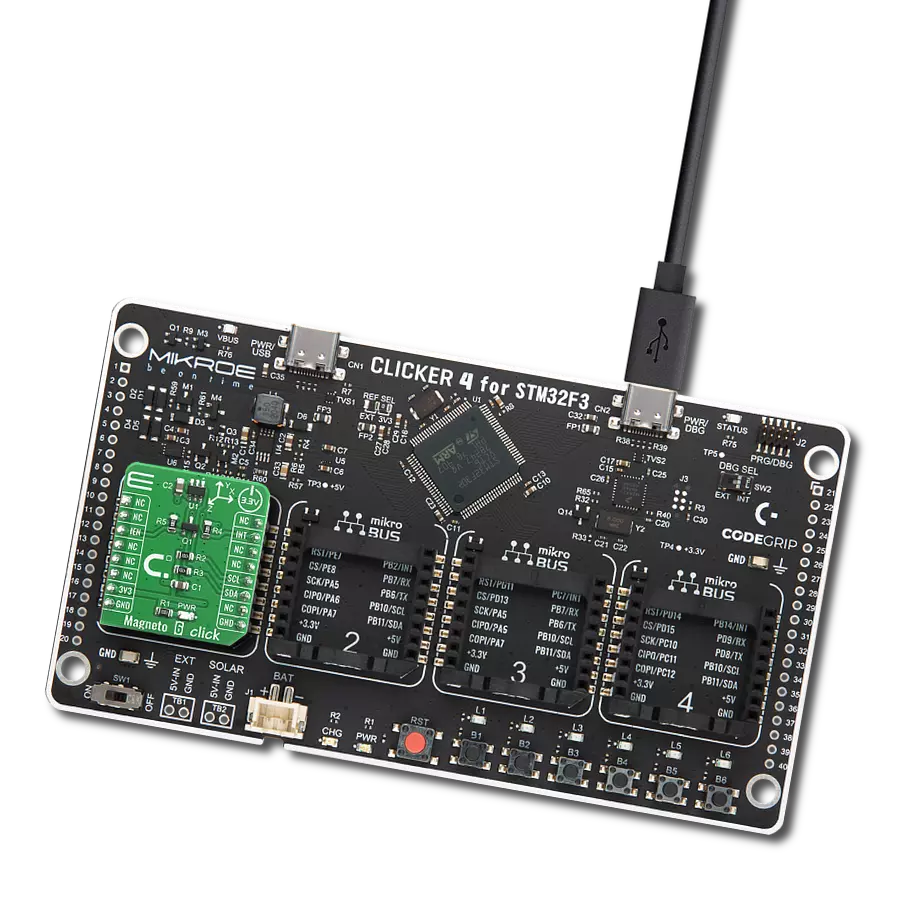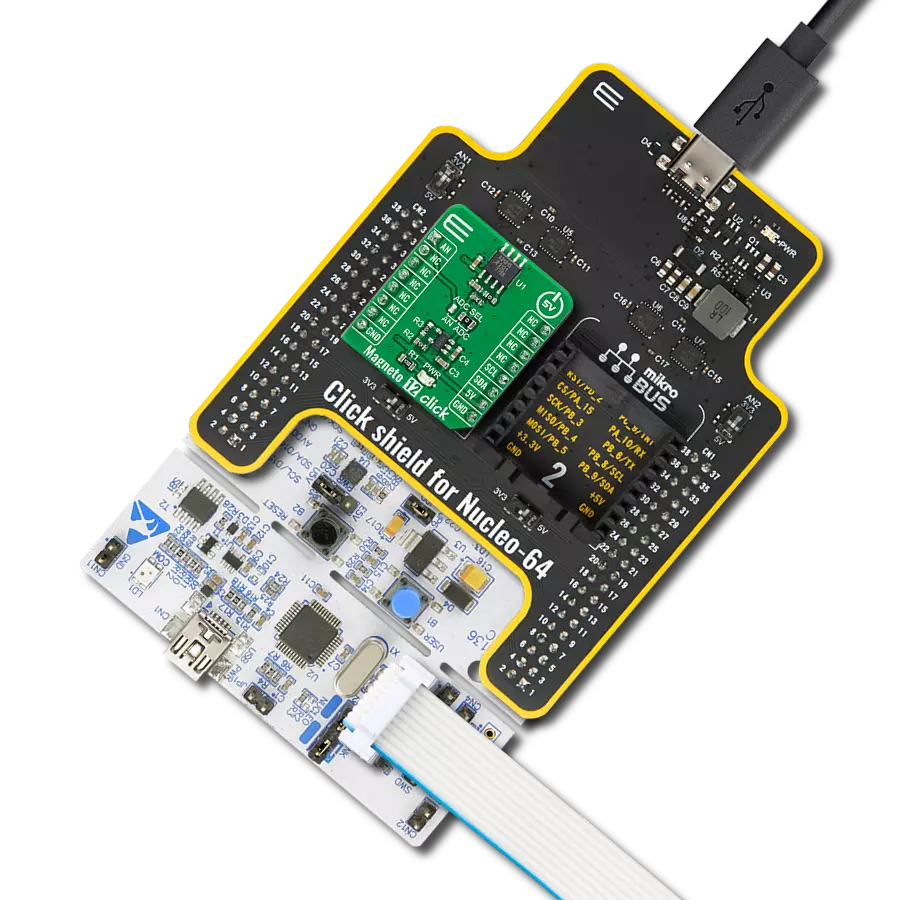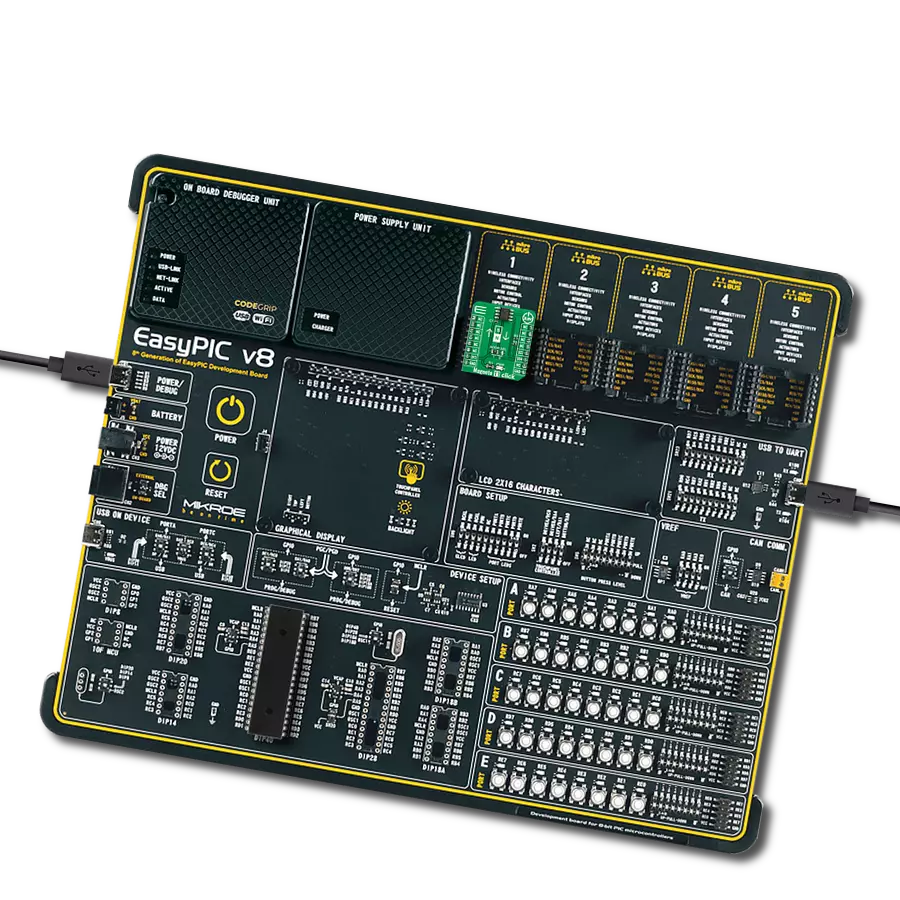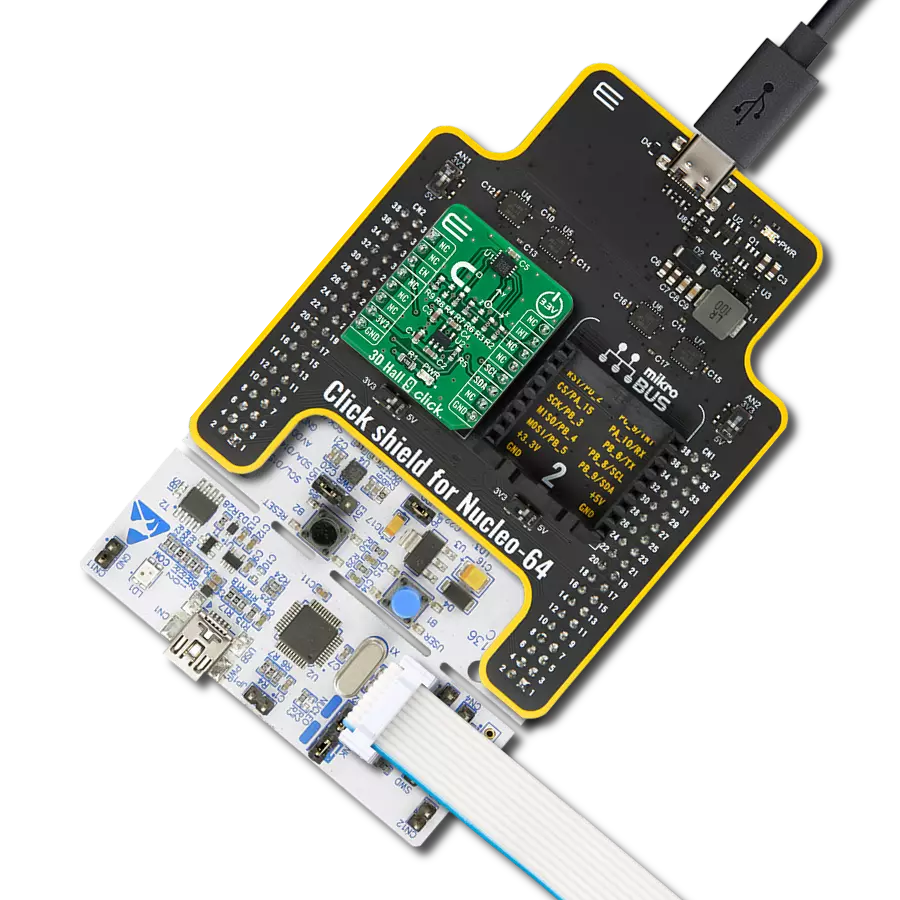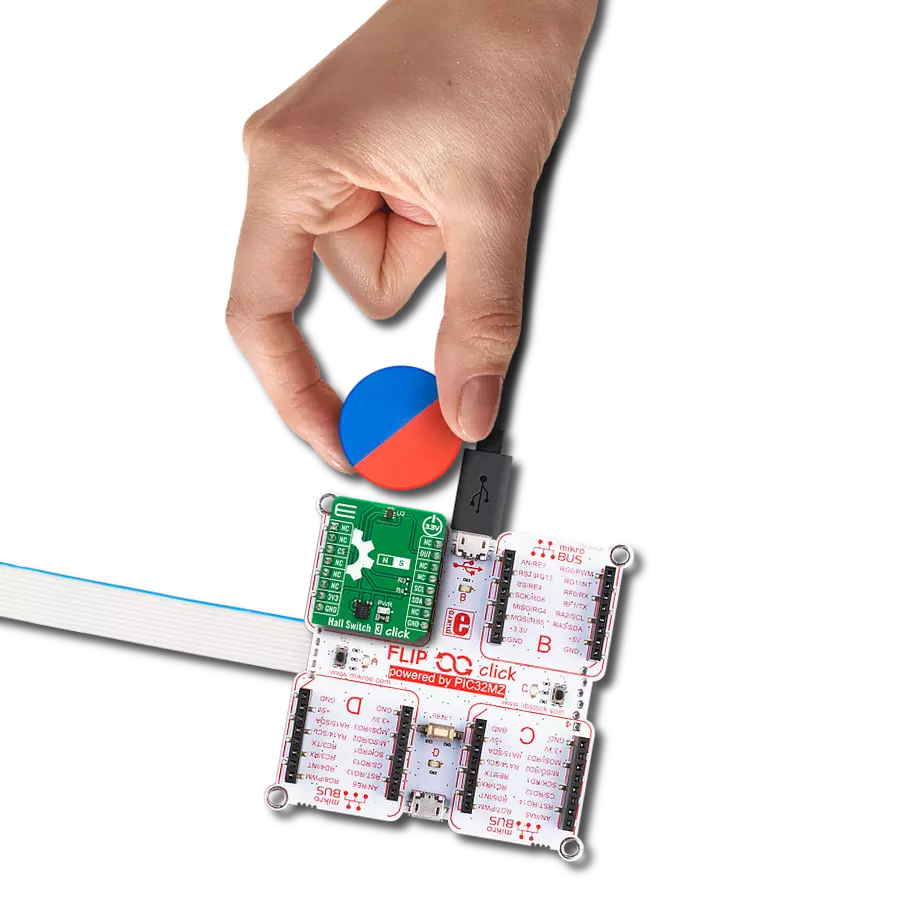利用我们的电子罗盘技术,放心地探索世界,它提供无与伦比的精度和易用性。
A
A
硬件概览
它是如何工作的?
Compass 6 Click基于ALPS Alpine的HSCDTD008A,这是一款高灵敏度的三轴地磁传感器。它具有集成的驱动电路、信号处理电路和串行接口模块,可以实现低噪声和高分辨率。HSCDTD008A可以测量每个三轴上的磁场强度为±2.4mT,并提供0.15µT/LSB的输出分辨率。此Click board™是实现电子罗盘等应用的理想选择。在操作开始时,通过打开电源将所有内部电路和寄存器设置为默认状态。通过上电
复位,操作模式会自动设置为低功耗待机模式。除了待机模式外,该传感器还具有通过寄存器命令访问的电源控制的主动模式。主动模式有两种状态:强制状态,通过寄存器命令开始测量并输出数据;和正常状态,通过内部计时器触发执行测量并输出数据。Compass 6 Click通过标准的I2C 2-Wire接口与MCU通信,以读取数据和配置设置,支持标准模式操作,时钟频率为100kHz,快速模式最高可达400kHz,Fast Mode
Plus最高可达1MHz,此外还支持高速模式。它还具有一个额外的准备信号,标记为RDY,并路由到mikroBUS™插座的INT引脚上,当新的测量结果更新时通知主机。此Click board™只能使用3.3V逻辑电压级别运行。在使用具有不同逻辑电平的MCU之前,板上必须执行适当的逻辑电压级别转换。此外,它配备了一个包含功能和示例代码的库,可用作进一步开发的参考。
功能概述
开发板
Flip&Click PIC32MZ 是一款紧凑型开发板,设计为一套完整的解决方案,它将 Click 板™的灵活性带给您喜爱的微控制器,使其成为实现您想法的完美入门套件。它配备了一款板载 32 位 PIC32MZ 微控制器,Microchip 的 PIC32MZ2048EFH100,四个 mikroBUS™ 插槽用于 Click 板™连接,两个 USB 连接器,LED 指示灯,按钮,调试器/程序员连接器,以及两个与 Arduino-UNO 引脚兼容的头部。得益于创
新的制造技术,它允许您快速构建具有独特功能和特性的小工具。Flip&Click PIC32MZ 开发套件的每个部分都包含了使同一板块运行最高效的必要组件。此外,还可以选择 Flip&Click PIC32MZ 的编程方式,使用 chipKIT 引导程序(Arduino 风格的开发环境)或我们的 USB HID 引导程序,使用 mikroC、mikroBasic 和 mikroPascal for PIC32。该套件包括一个通过 USB 类型-C(USB-C)连接器的干净且调
节过的电源供应模块。所有 mikroBUS™ 本身支持的 通信方法都在这块板上,包括已经建立良好的 mikroBUS™ 插槽、用户可配置的按钮和 LED 指示灯。Flip&Click PIC32MZ 开发套件允许您在几分钟内创建新的应用程序。它由 Mikroe 软件工具原生支持,得益于大量不同的 Click 板™(超过一千块板),其数量每天都在增长,它涵盖了原型制作的许多方面。
微控制器概述
MCU卡片 / MCU
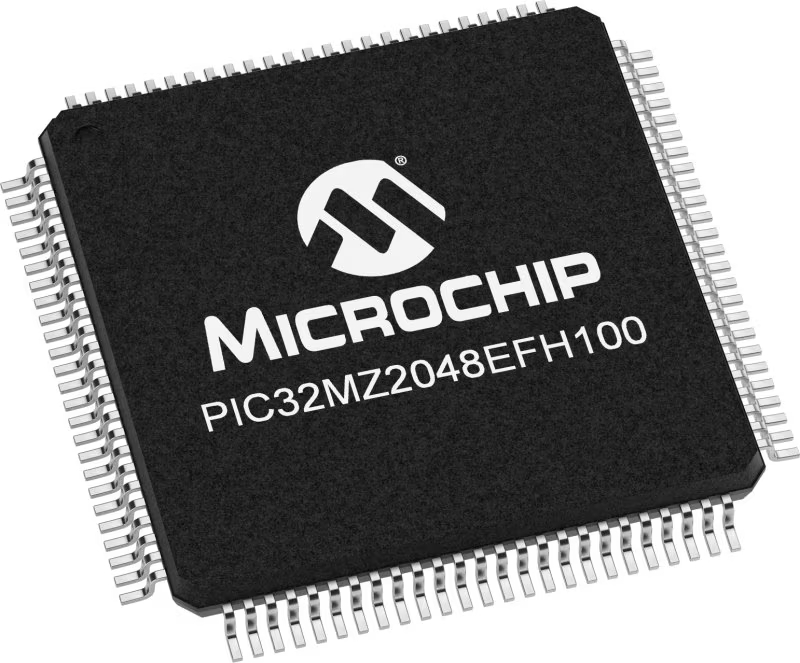
建筑
PIC32
MCU 内存 (KB)
2048
硅供应商
Microchip
引脚数
100
RAM (字节)
524288
使用的MCU引脚
mikroBUS™映射器
“仔细看看!”
Click board™ 原理图
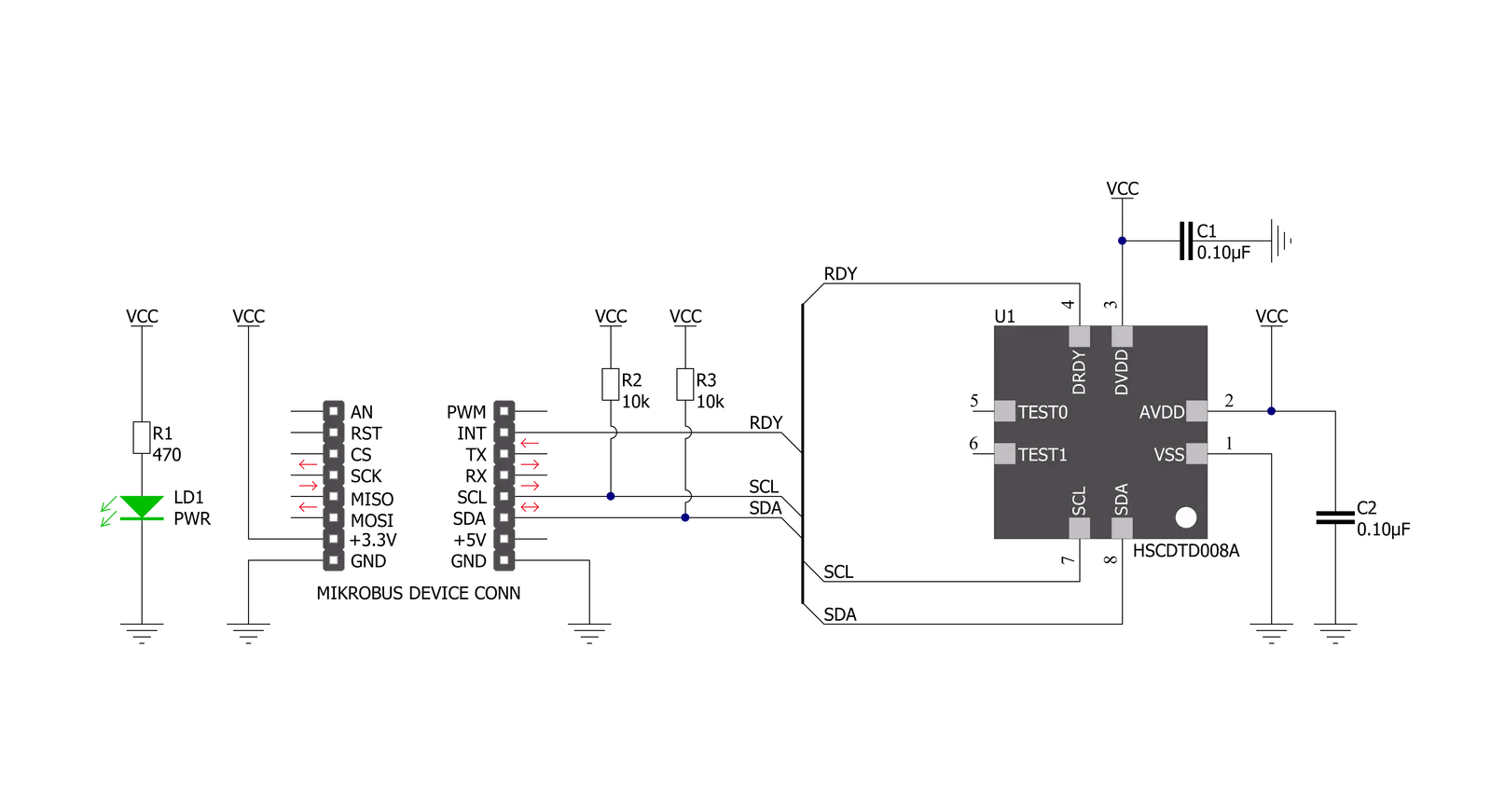
一步一步来
项目组装
软件支持
库描述
该库包含 Compass 6 Click 驱动程序的 API。
关键功能:
compass6_get_axes_data- 获取磁轴数据compass6_data_ready- 获取数据准备好引脚状态compass6_generic_read- 读取函数
开源
代码示例
完整的应用程序代码和一个现成的项目可以通过NECTO Studio包管理器直接安装到NECTO Studio。 应用程序代码也可以在MIKROE的GitHub账户中找到。
/*!
* @file main.c
* @brief Compass6 Click example
*
* # Description
* This example is a showcase the ability of the device
* to read 3 axis data of magnetic raw value when data is ready.
*
* The demo application is composed of two sections :
*
* ## Application Init
* Initialization of communication modules (I2C, UART) and data
* ready pin as input. Then reads identification data and checks
* if some of them have wrong value, and configures device for reading.
*
* ## Application Task
* Checks Data ready pin and if asserted high it will read data of all
* 3 axes(x, y, z) and log data to Terminal.
*
* @author Luka Filipovic
*
*/
#include "board.h"
#include "log.h"
#include "compass6.h"
static compass6_t compass6;
static log_t logger;
void application_init ( void )
{
log_cfg_t log_cfg; /**< Logger config object. */
compass6_cfg_t compass6_cfg; /**< Click config object. */
/**
* Logger initialization.
* Default baud rate: 115200
* Default log level: LOG_LEVEL_DEBUG
* @note If USB_UART_RX and USB_UART_TX
* are defined as HAL_PIN_NC, you will
* need to define them manually for log to work.
* See @b LOG_MAP_USB_UART macro definition for detailed explanation.
*/
LOG_MAP_USB_UART( log_cfg );
log_init( &logger, &log_cfg );
log_info( &logger, " Application Init " );
// Click initialization.
compass6_cfg_setup( &compass6_cfg );
COMPASS6_MAP_MIKROBUS( compass6_cfg, MIKROBUS_1 );
err_t init_flag = compass6_init( &compass6, &compass6_cfg );
if ( I2C_MASTER_ERROR == init_flag )
{
log_error( &logger, " Application Init Error. " );
log_info( &logger, " Please, run program again... " );
for ( ; ; );
}
uint8_t temp_data = 0;
compass6_generic_read( &compass6, COMPASS6_REG_WHO_I_AM, &temp_data );
log_printf( &logger, " > Who am I: 0x%.2X\r\n", ( uint16_t )temp_data );
if ( COMPASS6_WHO_AM_I != temp_data )
{
log_error( &logger, " Who am I. " );
}
compass6_generic_read( &compass6, COMPASS6_REG_INFO_VERSION, &temp_data );
log_printf( &logger, " > Version: 0x%.2X\r\n", ( uint16_t )temp_data );
if ( COMPASS6_VERSION != temp_data )
{
log_error( &logger, " Version. " );
}
compass6_generic_read( &compass6, COMPASS6_REG_INFO_ALPS, &temp_data );
log_printf( &logger, " > ALPS: 0x%.2X\r\n", ( uint16_t )temp_data );
if ( COMPASS6_ALPS != temp_data )
{
log_error( &logger, " ALPS. " );
}
compass6_default_cfg ( &compass6 );
log_info( &logger, " Application Task " );
Delay_ms ( 1000 );
Delay_ms ( 1000 );
}
void application_task ( void )
{
if ( compass6_data_ready( &compass6 ) )
{
compass6_axes_t axes_data;
compass6_get_axes_data( &compass6, &axes_data );
log_printf( &logger, " > X: %d\r\n", axes_data.x );
log_printf( &logger, " > Y: %d\r\n", axes_data.y );
log_printf( &logger, " > Z: %d\r\n", axes_data.z );
log_printf( &logger, "*********************\r\n" );
}
}
int main ( void )
{
/* Do not remove this line or clock might not be set correctly. */
#ifdef PREINIT_SUPPORTED
preinit();
#endif
application_init( );
for ( ; ; )
{
application_task( );
}
return 0;
}
// ------------------------------------------------------------------------ END
额外支持
资源
类别:磁性


















